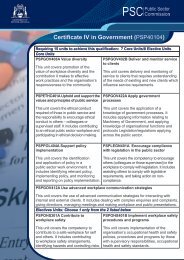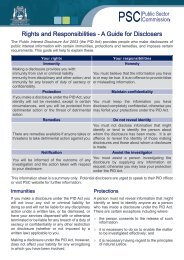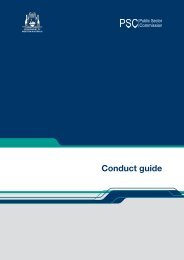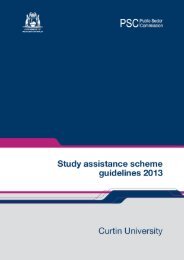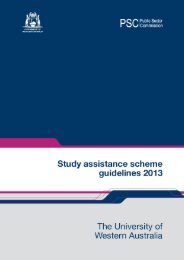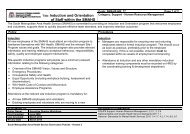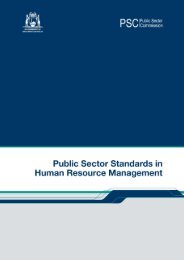Conduct Guide for Boards and Committees: Supporting Information
Conduct Guide for Boards and Committees: Supporting Information
Conduct Guide for Boards and Committees: Supporting Information
Create successful ePaper yourself
Turn your PDF publications into a flip-book with our unique Google optimized e-Paper software.
The <strong>Conduct</strong> <strong>Guide</strong> <strong>for</strong> <strong>Boards</strong> <strong>and</strong> <strong>Committees</strong><br />
PSC developed the <strong>Conduct</strong> <strong>Guide</strong> <strong>for</strong> <strong>Boards</strong> <strong>and</strong> <strong>Committees</strong> to assist government boards<br />
develop a code of conduct. This supporting in<strong>for</strong>mation should be read in conjunction with the<br />
conduct guide when developing a code of your own.<br />
The conduct guide sets out six categories where a public sector board member, executive officer<br />
or other officer of the board needs to display the appropriate behaviour <strong>and</strong> comply with the<br />
accountability framework set out in the legislature <strong>and</strong> by government.<br />
The supporting in<strong>for</strong>mation is consistent with the conduct guide. The six areas that should be<br />
reflected in your board or committee’s code of conduct are:<br />
●●<br />
●●<br />
●●<br />
●●<br />
●●<br />
●●<br />
Personal behaviour<br />
Communication <strong>and</strong> official in<strong>for</strong>mation<br />
Fraudulent <strong>and</strong> corrupt behaviour<br />
Use of public resources<br />
Record keeping <strong>and</strong> use of in<strong>for</strong>mation<br />
Conflict of interest<br />
The supporting in<strong>for</strong>mation provides the detail of the accountability framework, broken down into<br />
legislation <strong>and</strong> across-government requirements such as Premier’s Circulars <strong>and</strong> Treasurer’s<br />
Instructions. These are common to all public sector agencies <strong>and</strong> most public sector boards, <strong>and</strong><br />
are m<strong>and</strong>atory.<br />
The conduct guide is specifically aimed to help the executive officer of a board or committee<br />
fulfil their duties. It will help them allocate appropriate responsibilities to themselves <strong>and</strong> other<br />
members. It is the responsibility of each board to establish all of the legislation which governs the<br />
activities of the board.<br />
Referencing your board’s code of conduct to the <strong>Conduct</strong> <strong>Guide</strong> <strong>for</strong> <strong>Boards</strong> <strong>and</strong> <strong>Committees</strong> will<br />
ensure that you include the appropriate legislative obligations without necessarily having to restate<br />
specific requirements in the document. You should make sure that board members are aware<br />
of the conduct guide <strong>and</strong> supporting in<strong>for</strong>mation, <strong>and</strong> how to access the legislation <strong>and</strong> other<br />
government requirements it encompasses.<br />
4 Public Sector Commission




